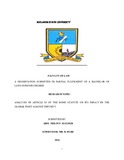Please use this identifier to cite or link to this item:
https://cris.library.msu.ac.zw//handle/11408/2266| Title: | Analysis of Article 98 of the Rome Statute on its impact in the global fight against impunity. | Authors: | Ndlovu, Abel | Keywords: | Rome statute Impunity |
Issue Date: | 2016 | Publisher: | Midlands State University | Abstract: | International criminal justice system thrives and survives on state cooperation. In order to end impunity and pursuant to the principles of individual criminal accountability and individual criminal responsibility, states are obliged to arrest and surrender suspects within their territories or in their custody or control in terms of Article 86 and 87 of the Rome statute. State cooperation with the ICC is peremptory, since it is the major weapon the court can use to bring the suspects to trial since the court does not have police force or service of its own to arrest and bring suspects before the court. States parties must co-operate fully with the ICC in its investigations and prosecutions of crimes within the jurisdiction of the court in terms of Article 86 of the Rome statute. Non state parties may be invited to provide assistance to the ICC in terms Article 87(5) (a) of the Rome statute. Article 89(1) provides that the ICC may request arrest and surrender of a person from any state on the territory of which the suspect may be found and shall request the cooperation of that state. The aforementioned provisions should be read mutatis mutandis with the provisions of Article 27 of the Rome statute whose provisions seek to remove impediments that may hinder the full cooperation of states with on the pretext of official and personal immunity. Article 27 states that there are no immunities that may hinder the court from exercising its jurisdiction on any person on the basis of official and personal immunity. The defense of immunity has grown over the years especially with African states in particular the recent cases of Uhuru Kenyatta (Kenya) and Al Bashir (Sudan) where African states requested a deferral from the United Nations Security Council on the basis that they were seating presidents and could not be prosecuted. These aforementioned provisions go a long way in promoting cooperation with the court. It is however, the provisions of Article 98 of the Rome Statute which seriously impact on state cooperation as it prohibits the court from compelling a state to surrender any person or property. which may cause state requested to invoke immunity or protection of the person of the person in terms of its obligations in terms of its obligations in bi-lateral agreements or International agreements. This research assesses the impact of Article 98 of the Rome statute to the state cooperation. | URI: | http://hdl.handle.net/11408/2266 |
| Appears in Collections: | Bachelor of Law Honours Degree |
Files in This Item:
| File | Description | Size | Format | |
|---|---|---|---|---|
| Ndlovu.pdf | Full text | 1.43 MB | Adobe PDF |  View/Open |
Page view(s)
240
checked on Feb 15, 2026
Download(s)
92
checked on Feb 15, 2026
Google ScholarTM
Check
Items in MSUIR are protected by copyright, with all rights reserved, unless otherwise indicated.



